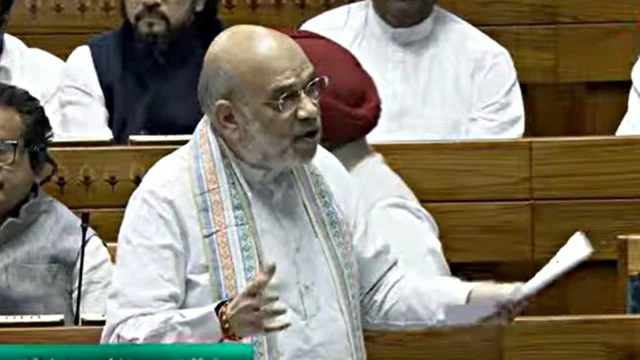
Union Home Minister Amit Shah said, “No provision to appoint any non-Muslim member to Waqf. We do not wish to do this. There will be no interference into Muslims’ religious matters. They are opposing this to appease their vote banks.
Photo from Sansad TV
Introduction
The Waqf Amendment Bill has been a significant legal development aimed at reforming the management and governance of waqf properties in India. Waqf properties, which are religious endowments, play a crucial role in the Muslim community’s social and economic welfare. However, issues like corruption, mismanagement, and lack of transparency have plagued waqf boards for years. The new amendments seek to address these concerns while ensuring efficient management and utilization of these properties.
In this post, we will cover what waqf is, when the Waqf Board was established, its shortcomings, the recent amendments, and how they benefit the community.
What is Waqf?
Waqf is a permanent charitable endowment under Islamic law where a person dedicates movable or immovable property for religious, educational, or welfare purposes. The property is then managed by a mutawalli (custodian), ensuring that its income is utilized for the intended purpose.
Types of Waqf:
-
Public Waqf – For the benefit of the general public, such as mosques, schools, hospitals, and orphanages.
-
Private Waqf – Dedicated to a specific group or family but still maintains a charitable aspect.
Formation of the Waqf Board
The Central Waqf Council (CWC) was established in 1964 under the Waqf Act, 1954, to oversee the administration of waqf properties across India. Each state also has its own State Waqf Board, responsible for managing and protecting waqf properties in their jurisdiction.
Objectives of the Waqf Board:
-
Protect and develop waqf properties
-
Ensure transparent financial management
-
Prevent illegal encroachments
-
Promote social welfare through waqf funds
-
Maintain an official record of all waqf assets
Despite these objectives, several shortcomings have been noted over the years, leading to a demand for legal reforms.
Shortcomings of the Waqf Board
1. Corruption and Mismanagement
Many waqf boards have been accused of corruption, with officials misusing funds and illegally leasing properties for personal gain.
2. Encroachment Issues
Thousands of waqf properties across India are illegally occupied, with no proper legal recourse to reclaim them.
3. Lack of Transparency
-
Waqf records are poorly maintained, making it difficult to track property transactions.
-
There is no central database for waqf properties.
4. Bureaucratic Delays
The lengthy legal and bureaucratic process often prevents waqf boards from making quick and necessary decisions regarding property management.
5. Inefficiency in Fund Utilization
Many waqf properties generate significant revenue, but the funds are not effectively utilized for the community’s welfare.
Key Amendments in the Waqf Amendment Bill
To address these issues, the government introduced new amendments to the Waqf Act, 1995. The latest reforms aim to streamline waqf management and enhance transparency in operations.
Major Changes in the Waqf Amendment Bill:
-
Digitalization of Waqf Records
-
All waqf properties must be registered in a centralized digital database.
-
Reduces the chances of fraud and encroachment.
-
-
Stronger Legal Framework Against Encroachments
-
Special waqf tribunals will be empowered to handle waqf-related disputes.
-
Stricter penalties for illegal occupation of waqf properties.
-
-
Greater Accountability and Transparency
-
Mandatory financial audits of waqf boards every year.
-
Online tracking system for leases and property transactions.
-
-
Empowerment of the Waqf Board
-
Waqf boards will have legal authority to evict encroachers without lengthy legal battles.
-
Strengthening the role of the Central Waqf Council in monitoring state waqf boards.
-
-
Better Utilization of Waqf Properties
-
Waqf lands can be legally leased for infrastructure development (e.g., hospitals, schools) while ensuring fair rent and accountability.
-
Benefits of the Waqf Amendment Bill
The Waqf Amendment Bill offers several advantages that will significantly improve the management and utilization of waqf properties.
1. Protection Against Encroachments
-
The new legal provisions will help protect waqf lands from illegal occupation.
-
Waqf boards will be able to act swiftly against encroachments.
2. Transparency and Good Governance
-
Digital records will ensure all transactions are accountable and traceable.
-
Regular audits will reduce corruption and fund misuse.
3. Increased Revenue for Social Welfare
-
Waqf assets will be better managed and properly utilized to fund education, healthcare, and employment programs.
4. Faster Conflict Resolution
-
Special waqf tribunals will ensure that property disputes are resolved quickly.
5. Boost to Economic Growth
-
Legal leasing of waqf properties for educational institutions, hospitals, and businesses will contribute to economic development while benefiting the community.
Frequently Asked Questions (FAQs)
Q1. What is the main objective of the Waqf Amendment Bill?
The bill aims to prevent corruption, protect waqf properties from encroachments, and improve transparency in waqf board operations.
Q2. How does the bill help prevent waqf land encroachment?
It strengthens legal provisions, allows waqf boards to evict encroachers quickly, and introduces a centralized digital database to monitor properties.
Q3. What impact will the amendments have on the community?
Better-managed waqf properties will generate more revenue for education, healthcare, and community welfare programs.
Q4. What are some common misinformation being circulated in media about the Waqf Amendment Bill?
-
False Claim: The government is taking over waqf properties.
-
Fact: The bill only strengthens waqf management and transparency, ensuring properties are not misused.
-
-
False Claim: Waqf properties can now be sold to private entities.
-
Fact: The law still prohibits the sale of waqf properties. Only regulated leasing is allowed for community welfare.
-
-
False Claim: The bill discriminates against a particular community.
-
Fact: The amendments focus solely on improving governance and efficiency, not targeting any religious group.
-
Conclusion:
In conclusion, the Waqf Amendment Bill marks a significant step toward transparency and accountability in managing waqf properties. Moreover, by addressing long-standing concerns, the bill ensures that these assets serve their intended social and economic purposes.
Furthermore, the amendments aim to eliminate corruption, providing a structured approach to governance while protecting the interests of both the waqf institutions and the public. As a result, communities can benefit from the proper utilization of waqf land without disputes and legal ambiguities.
However, misconceptions surrounding the bill have led to unnecessary controversy and misinformation. For instance, claims that the reforms take away religious rights are exaggerated and misleading. On the other hand, the actual provisions aim to safeguard assets and ensure lawful administration.
All things considered, the Waqf Amendment Bill is a progressive reform that seeks to modernize and strengthen the waqf system. Therefore, it is crucial for policymakers, legal experts, and the public to understand its true impact rather than relying on misinformation.
Have any questions or opinions on the Waqf Amendment Bill?
Leave a comment below or share this article with your network! 🚀

